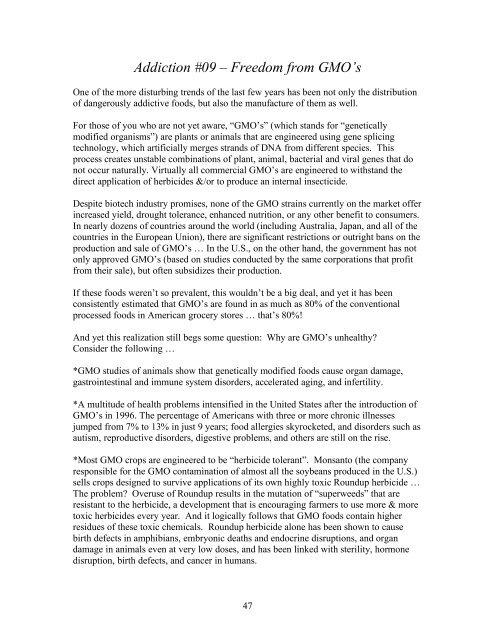Licking the Razor's Edge (2015)
Recognizing the hidden addictions that bind you, … to then set your True Self free
Recognizing the hidden addictions that bind you,
… to then set your True Self free
You also want an ePaper? Increase the reach of your titles
YUMPU automatically turns print PDFs into web optimized ePapers that Google loves.
Addiction #09 – Freedom from GMO’s<br />
One of <strong>the</strong> more disturbing trends of <strong>the</strong> last few years has been not only <strong>the</strong> distribution<br />
of dangerously addictive foods, but also <strong>the</strong> manufacture of <strong>the</strong>m as well.<br />
For those of you who are not yet aware, “GMO’s” (which stands for “genetically<br />
modified organisms”) are plants or animals that are engineered using gene splicing<br />
technology, which artificially merges strands of DNA from different species. This<br />
process creates unstable combinations of plant, animal, bacterial and viral genes that do<br />
not occur naturally. Virtually all commercial GMO’s are engineered to withstand <strong>the</strong><br />
direct application of herbicides &/or to produce an internal insecticide.<br />
Despite biotech industry promises, none of <strong>the</strong> GMO strains currently on <strong>the</strong> market offer<br />
increased yield, drought tolerance, enhanced nutrition, or any o<strong>the</strong>r benefit to consumers.<br />
In nearly dozens of countries around <strong>the</strong> world (including Australia, Japan, and all of <strong>the</strong><br />
countries in <strong>the</strong> European Union), <strong>the</strong>re are significant restrictions or outright bans on <strong>the</strong><br />
production and sale of GMO’s … In <strong>the</strong> U.S., on <strong>the</strong> o<strong>the</strong>r hand, <strong>the</strong> government has not<br />
only approved GMO’s (based on studies conducted by <strong>the</strong> same corporations that profit<br />
from <strong>the</strong>ir sale), but often subsidizes <strong>the</strong>ir production.<br />
If <strong>the</strong>se foods weren’t so prevalent, this wouldn’t be a big deal, and yet it has been<br />
consistently estimated that GMO’s are found in as much as 80% of <strong>the</strong> conventional<br />
processed foods in American grocery stores … that’s 80%!<br />
And yet this realization still begs some question: Why are GMO’s unhealthy?<br />
Consider <strong>the</strong> following …<br />
*GMO studies of animals show that genetically modified foods cause organ damage,<br />
gastrointestinal and immune system disorders, accelerated aging, and infertility.<br />
*A multitude of health problems intensified in <strong>the</strong> United States after <strong>the</strong> introduction of<br />
GMO’s in 1996. The percentage of Americans with three or more chronic illnesses<br />
jumped from 7% to 13% in just 9 years; food allergies skyrocketed, and disorders such as<br />
autism, reproductive disorders, digestive problems, and o<strong>the</strong>rs are still on <strong>the</strong> rise.<br />
*Most GMO crops are engineered to be “herbicide tolerant”. Monsanto (<strong>the</strong> company<br />
responsible for <strong>the</strong> GMO contamination of almost all <strong>the</strong> soybeans produced in <strong>the</strong> U.S.)<br />
sells crops designed to survive applications of its own highly toxic Roundup herbicide …<br />
The problem? Overuse of Roundup results in <strong>the</strong> mutation of “superweeds” that are<br />
resistant to <strong>the</strong> herbicide, a development that is encouraging farmers to use more & more<br />
toxic herbicides every year. And it logically follows that GMO foods contain higher<br />
residues of <strong>the</strong>se toxic chemicals. Roundup herbicide alone has been shown to cause<br />
birth defects in amphibians, embryonic deaths and endocrine disruptions, and organ<br />
damage in animals even at very low doses, and has been linked with sterility, hormone<br />
disruption, birth defects, and cancer in humans.<br />
47


















